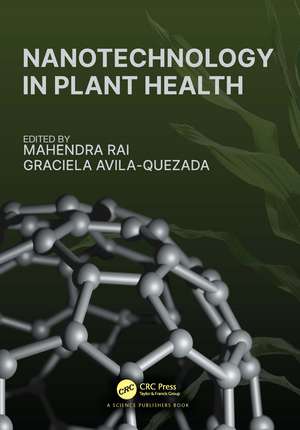Nanotechnology in Plant Health
Editat de Mahendra Rai, Graciela Avila-Quezadaen Limba Engleză Hardback – 23 apr 2024
The book Nanotechnology in Plant Health explores the significance of nanomaterials in plant nutrition, nanofertilizers, and their role in managing plant pathogens, including the most formidable ones like quarantined strains. This unique publication represents a global team of contributors and stands out for its comprehensive coverage of plant nanonutrients, nanofertilizers, and nano-plant protectors.
Preț: 1142.13 lei
Preț vechi: 1392.84 lei
-18% Nou
Puncte Express: 1713
Preț estimativ în valută:
218.58€ • 225.80$ • 181.91£
218.58€ • 225.80$ • 181.91£
Carte tipărită la comandă
Livrare economică 26 martie-09 aprilie
Preluare comenzi: 021 569.72.76
Specificații
ISBN-13: 9781032450360
ISBN-10: 1032450363
Pagini: 400
Ilustrații: 124
Dimensiuni: 178 x 254 x 22 mm
Greutate: 1.4 kg
Ediția:1
Editura: CRC Press
Colecția CRC Press
Locul publicării:Boca Raton, United States
ISBN-10: 1032450363
Pagini: 400
Ilustrații: 124
Dimensiuni: 178 x 254 x 22 mm
Greutate: 1.4 kg
Ediția:1
Editura: CRC Press
Colecția CRC Press
Locul publicării:Boca Raton, United States
Public țintă
AcademicCuprins
GENERAL. The Strategic Role of Nanotechnology in Plant Health Fitness—An Overview. Nanomaterials for Improving Health of Agricultural Crops and Forest Trees. APPLICATION OF NANOMATERIALS IN PLANT HEALTH FITNESS. Nanofertilizers for Sustainable Agricultural Practices. Agro-Nanotechnology: Zinc Oxide Nanoparticles as Nanofertilizers for Agriculture. Nanoencapsulation for Delivery of Agrochemicals to Boost Plant Health. Nanonutrients and Their Delivery in Crop Plants. Nano-Agri Products for Plant Health: From Lab to Farms. NANOTECHNOLOGY FOR MANAGEMENT OF PLANT DISEASES. Biological Agents for Synthesis of Nanoparticles and Their Applications Against Plant Pathogens. Silver Nanoparticles in Sustainable Management of Plant Pathogens. Plant Pathogens and Detection Approaches With Gold Nanoparticles. Facile Biosynthesis of Gold Nanoparticles Using Microbes and Their Applications in the Management of Economically Important Plant Pathogens. The Potential of Chitosan Nanoparticles to Control Plant Pathogens. Biological Nano-Selenium in the Service of Plant Health. Nanoscience and Nanomaterials to Control Postharvest Fungal Diseases. Inorganic Nanomaterials for Improved Abiotic Stress Tolerance in Crop Plants. Role of Plant-Derived Extracellular Nanovesicles in Triggering Innate Immune Response Against Plant Pathogens. Carbon Nanomaterials as Alternative to Control Plant Pathogens. Antiviral Activity of Nanoparticles in Plants. Nanomaterials for Quarantine Fungi and Bacteria Plant Pathogens. Recent Advances in Using Nanotechnology in the Management of Soilborne Plant Pathogens. Selenium, Sulfur and Tellurium Chalcogen-Containing Nanostructures: Synthesis, Properties, and Practical Applications in Agrochemistry and Phytopathology. Toxicity of Nanomaterials to Plants.
Notă biografică
Dr. Mahendra Rai is presently a visiting Professor at the Department of Microbiology, Nicolaus Copernicus University, Torun, Poland. Formerly, he was a Professor and Head of the Department of Biotechnology at SGB Amravati University in Maharashtra, India. He has also held positions as a visiting scientist at several prestigious institutions, including the University of Geneva, Debrecen University in Hungary, the University of Campinas in Brazil, VSB Technical University of Ostrava in the Czech Republic, the National University of Rosario, in Argentina, and the University of Sao Paulo. Dr. Rai has an impressive publication record, with over 425 research papers published in national and international journals with 80 h-index. In addition, he has edited/authored more than 70 books and holds 6 patents. Notably, he has been recently featured in Stanford’s list of the top 2% of scientists in nanoscience and nanotechnology.
Dr. Graciela Avila-Quezada is a Professor at Faculty of Agrotechnology Science, Universidad Autónoma de Chihuahua, in Mexico. She has been conducting research related to plant pathogens for 30 years, beginning with her undergraduate thesis work focused on the control of Puccinia graminis f. sp. avenae. She has held positions as a visiting scientist in various eminent institutions, including the Volcani Center in Israel, Colegio de Postgraduados in Texcoco, Mexico, SENASICA Laboratories (Ministry of Agriculture) in Tecamac, State of Mexico, the California Polytechnic State Univ-San Luis Obispo California (Calpoly), Institut de Recherche pour le Développement IRD Montpellier, France, Universidad Autónoma Chapingo in the State of Mexico, and Universidad de Córdoba in Spain. Dr. Avila has also held several notable positions, including President of the Mexican Society of Phytopathology, Vice-president of the National Phytosanitary Advisory Council (CONACOFI), Executive Secretary of the National System for Research and Technology Transfer (SNITT) of the Minister of Agriculture (Sagarpa), and Director of Academic Cooperation, in the Coordination of Science and Technology at the Presidency of Mexico. Additionally, she has conducted more than 12 research projects and published over 70 research papers in national and international journals focused on plant pathogens.
Dr. Graciela Avila-Quezada is a Professor at Faculty of Agrotechnology Science, Universidad Autónoma de Chihuahua, in Mexico. She has been conducting research related to plant pathogens for 30 years, beginning with her undergraduate thesis work focused on the control of Puccinia graminis f. sp. avenae. She has held positions as a visiting scientist in various eminent institutions, including the Volcani Center in Israel, Colegio de Postgraduados in Texcoco, Mexico, SENASICA Laboratories (Ministry of Agriculture) in Tecamac, State of Mexico, the California Polytechnic State Univ-San Luis Obispo California (Calpoly), Institut de Recherche pour le Développement IRD Montpellier, France, Universidad Autónoma Chapingo in the State of Mexico, and Universidad de Córdoba in Spain. Dr. Avila has also held several notable positions, including President of the Mexican Society of Phytopathology, Vice-president of the National Phytosanitary Advisory Council (CONACOFI), Executive Secretary of the National System for Research and Technology Transfer (SNITT) of the Minister of Agriculture (Sagarpa), and Director of Academic Cooperation, in the Coordination of Science and Technology at the Presidency of Mexico. Additionally, she has conducted more than 12 research projects and published over 70 research papers in national and international journals focused on plant pathogens.
Descriere
The book "Nanotechnology in Plant Health" explores the significance of nanomaterials in plant nutrition, nanofertilizers, and their role in managing plant pathogens, including the most formidable ones like quarantined strains.
